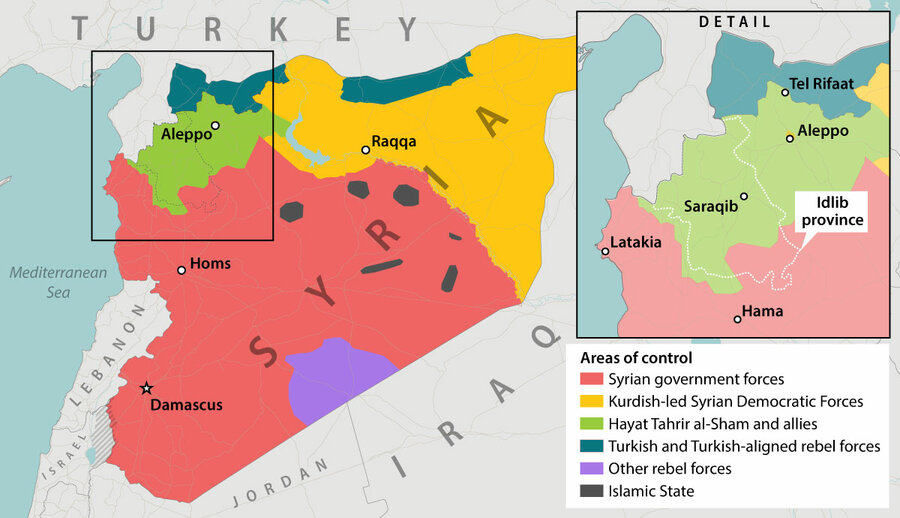Syrian civil war: What rebels’ lightning gains say about Assad regime
Loading...
The surprise offensive by Syria’s armed opposition groups, a dramatic reawakening of the country’s long-dormant civil war, drove regime forces from Syria’s second-largest city, Aleppo, with shocking speed.
The offensive last week successfully capitalized on the weakened and distracted state of Syrian President Bashar al-Assad’s key allies, as well as the rebels’ military preparedness, built over years. And it completely upended the narrative that Mr. Assad is victorious and largely in control after years of unresolved conflict.
“The capture of Aleppo clearly shows that the regime is much weaker than it was in the past,” says Jerome Drevon, senior analyst on jihad and modern conflict at the International Crisis Group. “That without strong external support by groups like Hezbollah, Shiite militias from Iraq, Russian air support, it can’t really maintain control over all of the country.”
Why We Wrote This
Syria’s devastating civil war, responsible for more than 300,000 deaths, was never officially resolved. While lightning gains last week by rebels opposed to President Bashar al-Assad were opportunistic, they also indicated years of patient preparations.
The rebels’ lightning offensive started Nov. 27, the same day that a ceasefire between Israel and the Shiite militia Hezbollah – Iran’s badly battered ally and a decisive military supporter of the Assad regime at the height of the civil war – entered into force in neighboring Lebanon.
Russia – another key Assad ally that has helped his regime control the skies and bomb opposition strongholds into submission – is busy fighting its war in Ukraine.
With Iran-backed Shiite militias shifting their attention and resources from Syria to Lebanon, the window of opportunity was there. But fortune also favors the prepared, and the armed opposition was ready.
“This is not just sheer opportunism,” says Mr. Drevon. “In reality, the armed opposition for the past four or five years has really reconstituted itself, reorganized its military forces, undertaken new training, increased professionalism. They wanted to do that for a very long time.”
This is not the first time rebels have entered Aleppo, but their control is likely to be more sustainable this time around, Mr. Drevon says, as they hold both the whole city and the surrounding countryside. In 2016, rebel forces only controlled some peripheral neighborhoods, while the regime held on to the core and more affluent areas. Even so, it took years to defeat and rout the rebel back then.
The rebel offensive has rekindled Syria’s civil war, a devastating conflict responsible for more than 300,000 deaths and the displacement of nearly 6 million refugees. While the war was never officially resolved, this surge in hostilities represents the most serious escalation since a 2020 ceasefire in northwestern Idlib province, brokered by Russia and Turkey.
“We are a proper army now”
The new offensive – dubbed Operation Deter Aggression and led by the Islamist militant group Hayat Tahrir al-Sham – captured dozens of towns and villages west of Aleppo before advancing into the city center by Friday night. In tandem, another offensive in Idlib seized the strategic town of Saraqib, while a third targeted Tel Rifaat, north of Aleppo.
“It’s not like before,” says a longtime rebel fighter who gives his first name, Khaldoun, and who took part in the capture of the Kuweires Military Airport in Aleppo. He is now a member of the Turkey-backed Syrian National Army, previously known as the Free Syrian Army.
“We are a proper army now, with special ops and intelligence units,” he says. “Everything is well organized. We seized the moment and struck. It surprised us how quickly they fled.”
Russia and Iran are now scrambling to help Mr. Assad wage a counteroffensive. The starting point is reinforcing the front lines to the north of Hama and bombing Aleppo and Idlib.
Russian and Syrian jets targeted rebel positions in Aleppo and health care facilities in Idlib Monday, according to the Syrian Observatory for Human Rights, which reports over 500 civilian and combatant fatalities since Nov. 27. Iranian Foreign Minister Abbas Araghchi was in Damascus Sunday evening to convey Tehran’s sustained support.
“It is unclear to what extent [Mr. Assad’s allies] can really replicate the victories of the past,” says Mr. Drevon, the analyst, noting that Iran-linked Shiite militias are not as strong as they once were and could be weakened by further Israeli strikes. Russia can help control the skies, but it cannot change the situation on land without boots on the ground.
“Russia can weaken the armed opposition, can strike them, but without ground troops you can’t really protect territories,” points out Mr. Drevon. “So they really need those ground troops from Shiite militias and foreigners.” Hundreds of Iraqi Shiite fighters reportedly entered Syria from overnight Sunday to Monday.
Turkey, meanwhile, will be a force supporting the rebel gains, he says. It did not necessarily want the armed opposition to take Aleppo, but understood that an operation was in the making.
For Turkey, stabilizing northern Syria is important. It helps reduce security risks and stabilizes the humanitarian situation. In the long run, it could pave the way for the return of Syrian refugees to Aleppo from Turkey.
Stalled talks
Soner Cagaptay, director of the Turkish Research Program at The Washington Institute, agrees. He says Turkey’s decision to green-light the Aleppo offensive was a direct response to stalled negotiations with the Assad regime.
Confident in his perceived victory in the civil war, President Assad had taken a maximalist position, refusing Turkey’s requests to repatriate refugees and normalize ties. This left Ankara with little choice but to pursue alternative strategies, Mr. Cagaptay says.
Another factor for Ankara, he says, was recent regime assaults on rebel-held areas. It looked like they were going to trigger another wave of refugees toward Turkey.
“Ankara is telling Assad, ‘We made you an offer; you didn’t take it, [so] we are going to change the status quo in the battlefield in favor of the rebels and you will have a weaker hand coming to the negotiating table,’” Mr. Cagaptay says.
Syrian rebels for now are confident they can push forward. Aleppo was the scene of some of the worst fighting in the course of the civil war. Now they hold it.
“It is a great feeling,” says Khaldoun, the rebel veteran. “We have freed regions from a tyrant that has killed and displaced us for 13 years. Every day, every hour there is an advance, and we’ll keep going.”









